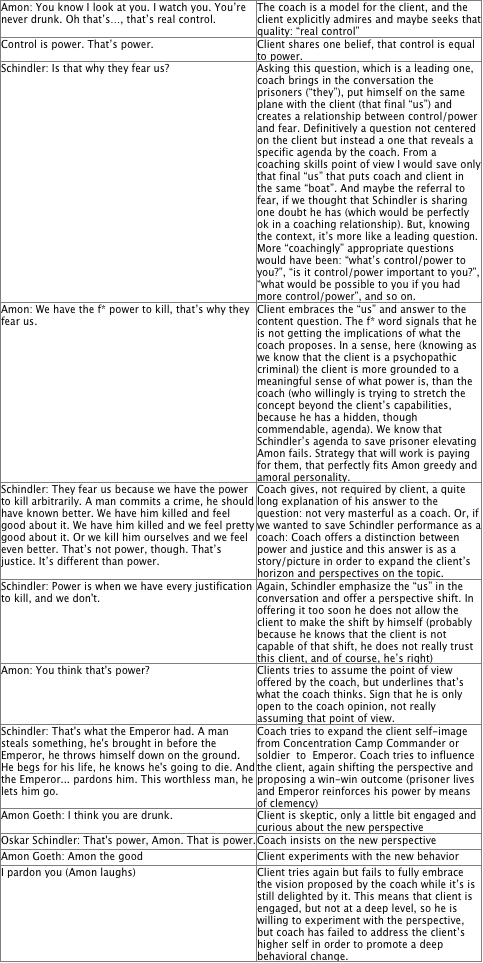
Guest post by David Papini, CCC.
Coaching is about conversations and human beings.
Conversations happen in different contexts and human beings can be criminals. Coaching is powerful, but has limits. Can you coach psychotics? Can you coach evil clients? Can you coach a Nazi?
There is a scene from Steven Spielberg’s Schindler’s List where Oskar Schindler (actor Liam Neeson) is talking with Amon Goeth (actor Ralph Fiennes) and tries to convince him to change his evil criminal “behavior” toward the prisoners.
Here is the conversation from a coaching technique point of view where Amon is the client and Schindler the coach:

If you put aside the maybe weird and scary feeling of coaching someone seriously mentally ill, with criminal traits and in a position of real power (as Amon Goeth was, in reality and in the movie) you may recognize that it is possible to meet clients with at least one of these trait (hopefully with lower intensity). Among the three traits (mental illness, propensity to criminal acts, power in an organization) I think that mental illness is the one that “technically” excludes the possibility of coaching because a coach cannot address the real (neither the great) self of the client, because that self is seriously damaged: only therapy maybe can.
Propensity to criminal acts poses an ethical problem, because it is possible, technically, to coach a client while embracing his criminal or violent self, but this puts the coach in the position of supporting a criminal (which is a moral and legal issue, not a technical one). For the sake of the discussion, if you are a criminal and a coach, you can coach a criminal, if you do not share the same criminal background, you may want to coach a client that wants to change his criminal behaviors in the future, but even in this case you cannot have a hidden agenda (like “helping the client to become a good citizen”) only an agenda that is shared with him.
If agendas (yours or client’s) are illegal or unethical or hidden, you cannot coach.
Coaching a powerful person, of course, can be done and I think that when my client’s real power (or status) is higher than mine, what makes the coaching relationship a good one is establishing that “us” mindset. Which is the only part that I would save of the otherwise poor Schindler’s coaching performance.

Visit David Papini's Coach 100 Page Here.
David was born in Florence in 1966 just a few months before the deluge, and that's a kind of destiny. As an executive is in charge for general management in a IT Firm, as a certified NLP counselor helps clients to explore their life experience, as a Coach helps clients getting what they really want, as a conflict mediator witnesses how tough and creative a relationship can be, as a trainer helps trainees in stretching their brain, growing and learning, as a public speaker enjoys co-creating experience on the fly, as a dad loves his two children. As a man he is grateful and worried that he’s got this wonderful life. And he’s fond of categorizing his professional roles :-). More about him at http://papini.typepad.com/lifehike/
Flicker Creative Commons photo by HistoryIn An Hour



